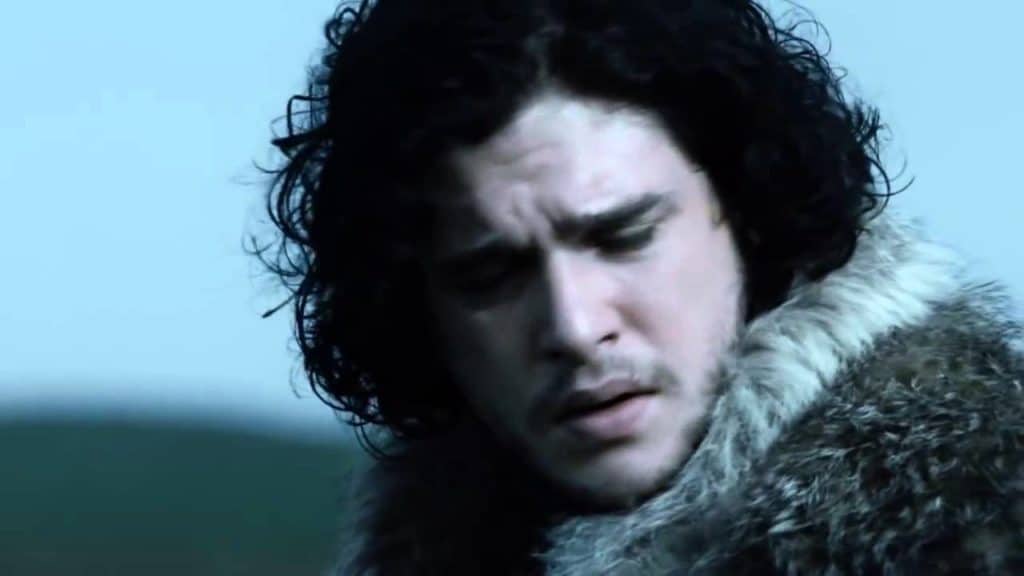
To look for a psychology of Jon Snow and Game of Thrones we need to hold this story as a dream or fairytale. And look to see what it may be pointing to. That way it is useful for us, as insight or guidance.
When we have a dream or read an ancient fairytale there is usually a feeling of curiosity that comes with the symbolic images, the strange relationships among the characters and wild feelings of all sorts. We know there is some meaning or usefulness in the dream or in a fairytale. 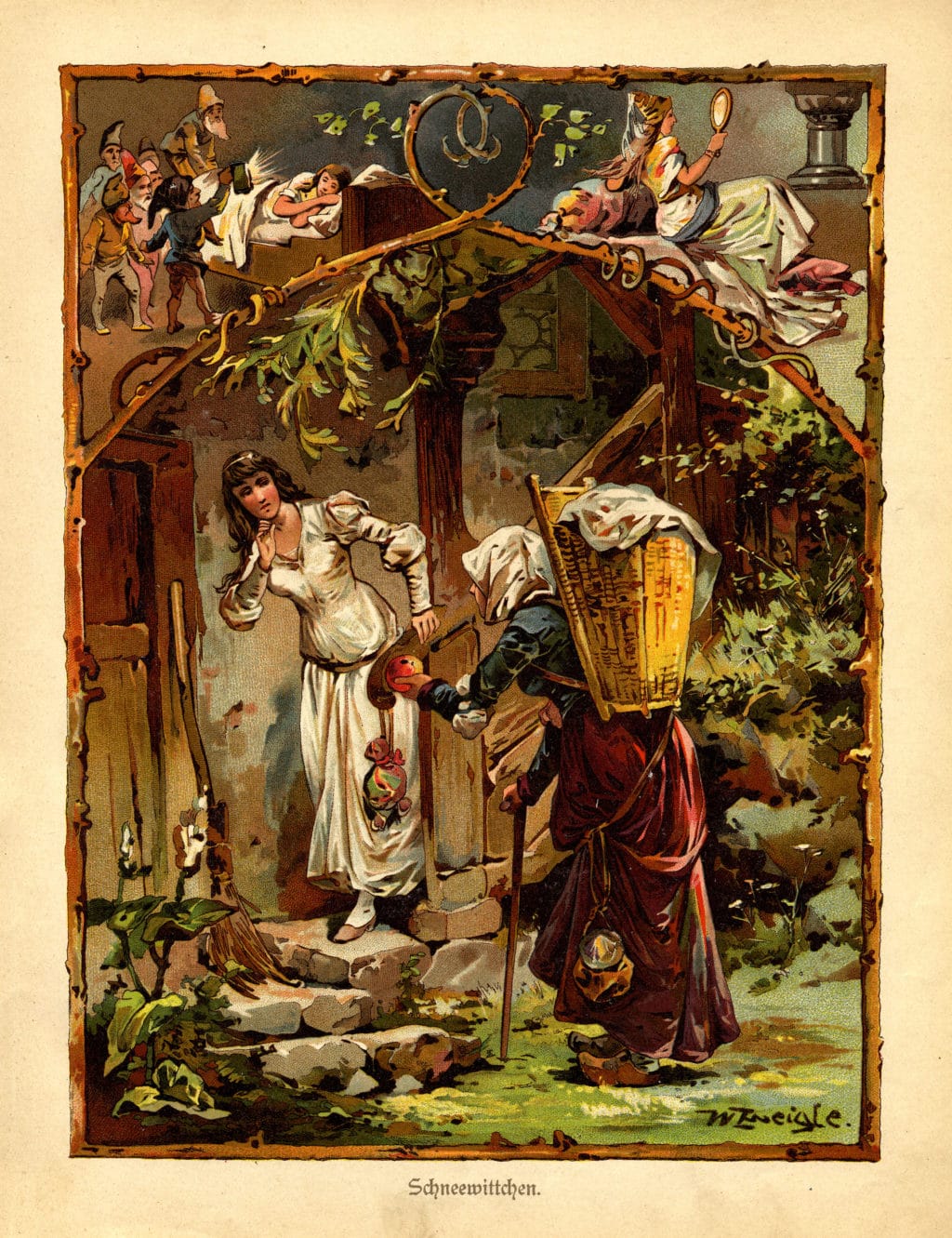
“If one studies the psychological implications of myths, one sees that they very much express the national character of the civilization in which they originated and have been kept alive.” The Interpretation of Fairy Tales By Marie-Luise von Franz, P.26
How does Jon Snow and Game of Thrones “express the national character”?
Jon Snow is contrasted against an age of darkness and brutality. His personal history started with violence and abandonment. The world he is born into is dark and on the verge of war.
Jon Snow has been able to preserve a sense of self within the constant barrage of loss, shame, rejection, abandonment and death. This is everyone’s work.
He is a hero because he keeps a sense of integrity within a life of deep emotional pain starting at birth; losing his parents and adoption into a family where his adopting mother Catelyn scorned him. He would suffer from abandonment issues and a inferiority complex all his life.
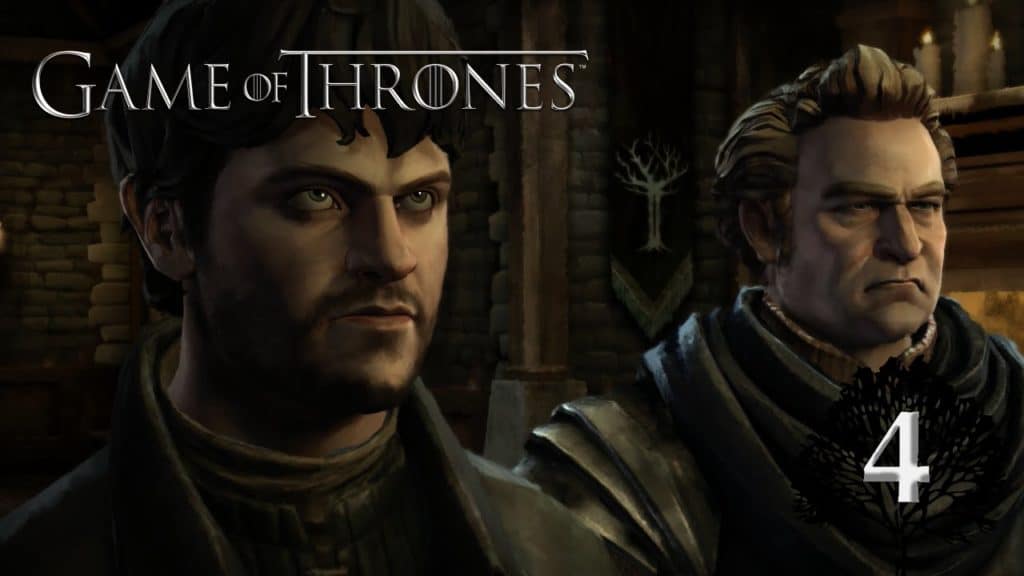 Jon Snow is a scapegoat for the culture at large; We hear him repeatedly identified as the “the bastard”, yet he keeps his nose above water and does not succumb to a shamed based identity.
Jon Snow is a scapegoat for the culture at large; We hear him repeatedly identified as the “the bastard”, yet he keeps his nose above water and does not succumb to a shamed based identity.
Rejection is his primary experience and yet he keeps a sense of self, a naive self, but a self that does not completely identify with the darkness all around him. The same quality of Ned Stark his adopting father.
He could have easily become like many other men around him, self possessed by greed and hatred. Similar tragedy happened to them too.
Jon Snow is able to see something and feel something many other men can not. He is able to keep his “light on”. He can perceive a more evolved character and more evolved way to live and treat others.
Tyrion is another character who embodies the same theme of scapegoat. He is not taken in by his family and the society around him. His over compensation is “wine and women”.
How does this tale of Jon Snow connect to me?
Jon Snow represents that part in us that needs to evolve even in a world that seems on the brink of psychological, spiritual and physical disaster.
Game of Thrones takes place in vastness. The Wall is mythically huge. Winters can go on for years and if the Lannisters don’t get you the Wildlings will. The forces of the world leaders are based in greed, anger and ignorance.
These conditions reflect the overwhelming anxiety our general population carries today. Some people are very conscious of it and are working hard to wake up and others very unconscious of this anxiety, thinking the “bad man is out there”.
Fairytales provide images and feelings for the suffering of human life and much of the suffering that is still unconscious. That is why a story can be so engrossing and consuming. It is like a dream that we know has a big message but we are not sure what that message is or what the dream is trying to teach us.
Psychiatric Diagnosis
Some of the leaders of the Seven Kingdoms, such as, Tywin Lannister embody the diagnosis of narcissistic personality disorder and sociopathic personality disorder(now called antisocial personality disorder). I would also toss in “with psychotic features”. This means zero empathy for others, even their own children. These disorders develop from a long history of brutality as a way of life, in the family and outside the family. It can appear as unbridled primitivity that has no value or experience with a genuine human relationship.
Dreams and fairytales exaggerate images to get our attention. We still have narcissistic world leaders with little regard for human life. The same diagnosis as the kings and queens of the past and those in Game of Thrones. Some of our world leaders of today may not seem as severe on the surface as those in this tale but close enough. The vulnerability of our general population is still working with the same anxiety issues.
For example, gun violence against race, increasing terrorism, and many of our leaders have access to nuclear and biological weapons.
Dreams and fairytales amplify characters to shine light on their meaning. The Lannister’s and Baratheon’s have similar attitudes toward the world as we see today in our world. The brutality still has grave consequences to all involved. Twenty-two soldiers that are returning from the Afghanistan and Iraqi wars commit suicide every day.
Jon Snow, Snow White, and Ygritte 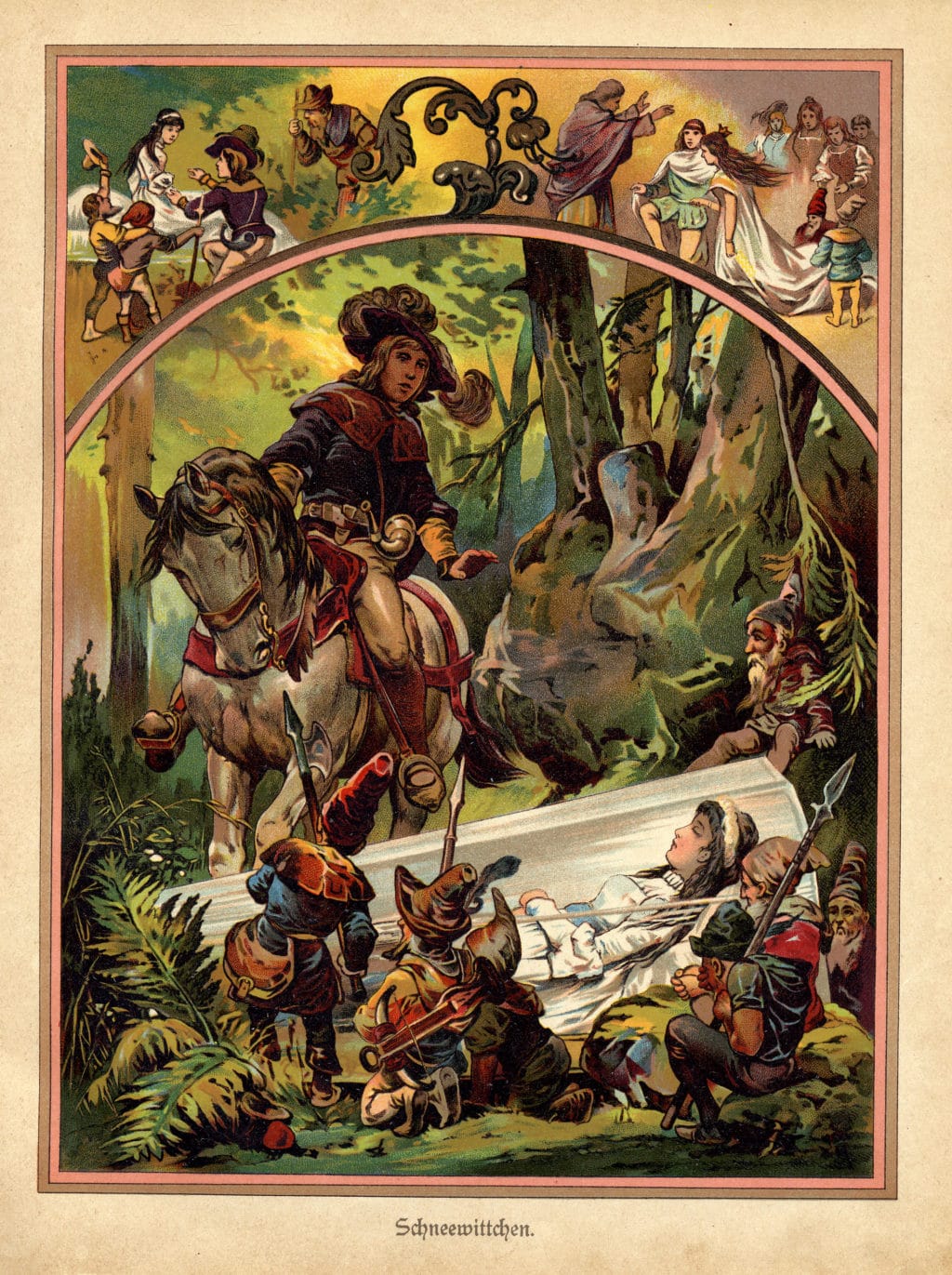
When a story is taken in with such demand as Game of Thrones, it means something to the culture at large. It is like a cultural dream, just as Snow White served a purpose when it came out in nineteen century Germany. Even though these same themes are ancient they are still relevant in our so called modern world.
“Myths and fairytales give expression to unconscious processes, and their retelling causes these processes to come alive again and be recollected, thereby re-establishing the connection between conscious and unconscious.” C.G. Jung
Symbolically, Jon Snow and Snow White have many similar themes; such as, a dead mother, death and rebirth, and love with another as a spiritual and psychological awakening.
Jon Snow was shown love with Ygritte, as the Prince with Snow White. Ygritte awakened him from an adolescent naivety just as the prince did with Snow White. 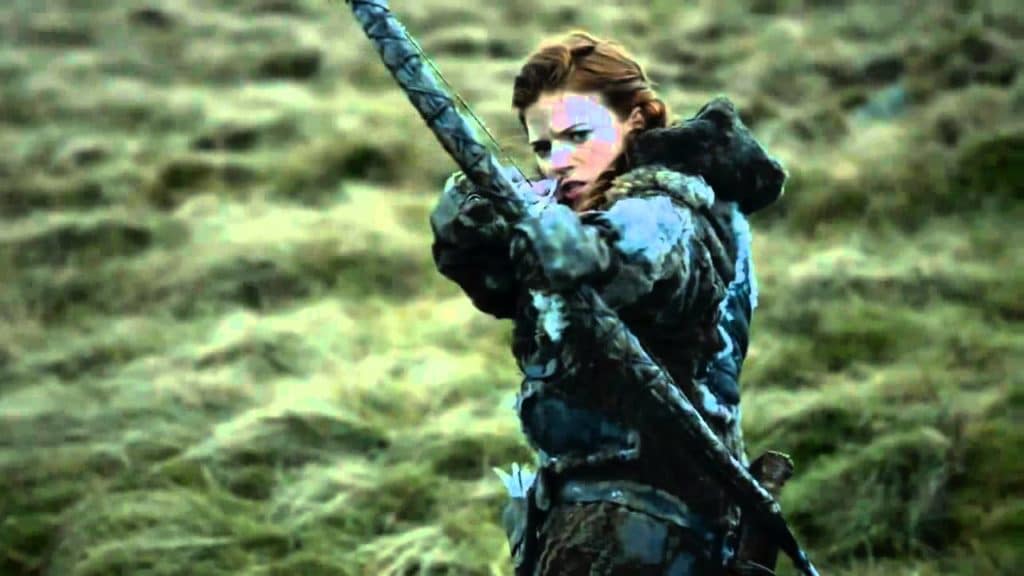
They were both caught in a painful life and needed to awaken to a higher consciousness. Love with another or loving oneself can be the beginning of breaking out of conditioned cultural attitudes that are no longer useful.
A story can provide hope in a time of darkness.
The psychotherapist Bruno Bettelheim pointed out how children use fairytales to process emotion that they cannot speak about or think about because they are too young. They have the feelings. The fairytale gives a means to process violence, fear, love, loss and so forth. Find out more about this in his book, The Uses of Enchantment.
These stories with all their beauty and terror provide a method of processing emotional experiences for all ages. As Jung said above, “re-establishing the connection between conscious and unconscious.” This gives us that sense of self that is hard won sometimes.
What do fairytales mean?
Many themes repeat over and over in myth and story. Yet, we are still attracted to their enactment, in a movie or novel. Some of the most common themes are of lovers, good and evil, rich and poor, absent fathers, witchy mother’s, and the hero. We love our heroes because they give us hope, strength, a certain morality, and ways to deal with darkness and tragedy…….…(fill in the blank for yourself).
Our popular myths tell us about our cultural “character”. We have an opportunity to look at our personal and cultural psychology through these images and feelings.
How to use Dreams and Fairytales
We all have many sub-personalities within our larger personality. Dreams and fairytales put faces and characters to parts of ourselves that are within. As we get older and develop a healthy ego, we are able to accept more about our whole personality and manage all the parts a little better.
For example, many of us have a part that is courageous, yet wounded like Jon Snow and the same naivety in love. A part of us has the freshness and willingness to learn as Arya and a vengeful streak like Cersei. We may have a morning personality like Hodor. All we can say in the morning before coffee is, “Hodor”. We can observe externally in the movie, dream or fairytale, parts that we have internally.
In our regular life the stories that we tell ourselves about who we are can help us organize our emotional and spiritual life or they can also bury it. This depends on how accepting we are of the various parts of our complete personality or “character”.
Talking about fairytales and stories with others to hear their perspectives is fascinating. It is interesting to see what we are attracted to or repulsed by. How do we find love? What do I do with my feelings about my father? I love my mother and I hate my mother, What’s that?
Jon Snow and Snow White come back from a fairytale death. In psychology this represents an ego death that everyone goes through from time to time. Our old ways have to die for new strength and insight to appear.
We see that stories make up a structure of how we can relate to feelings of utter brutality, ecstatic sex, true love, and the most tender connections between parent and child.
